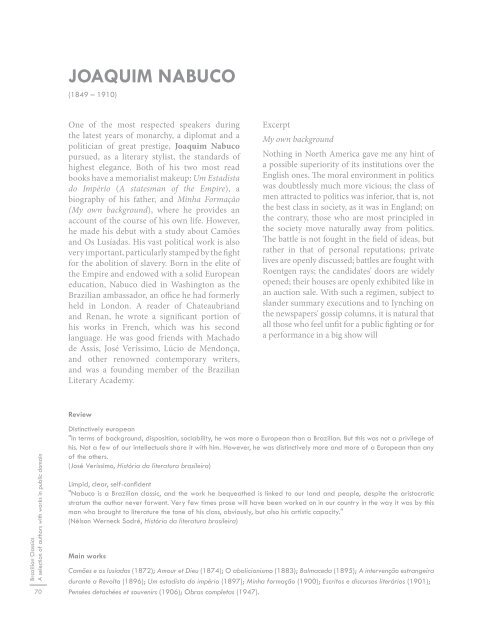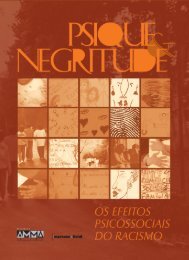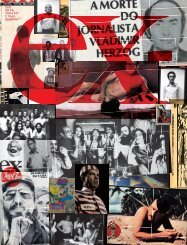CLÁSSICOS BRASILEIROS BRAZILIAN CLASSICS - Imprensa Oficial
CLÁSSICOS BRASILEIROS BRAZILIAN CLASSICS - Imprensa Oficial
CLÁSSICOS BRASILEIROS BRAZILIAN CLASSICS - Imprensa Oficial
Create successful ePaper yourself
Turn your PDF publications into a flip-book with our unique Google optimized e-Paper software.
Brazilian Classics<br />
A selection of authors with works in public domain<br />
70<br />
JOAQUIM NABUCO<br />
(1849 – 1910)<br />
One of the most respected speakers during<br />
the latest years of monarchy, a diplomat and a<br />
politician of great prestige, Joaquim Nabuco<br />
pursued, as a literary stylist, the standards of<br />
highest elegance. Both of his two most read<br />
books have a memorialist makeup: Um Estadista<br />
do Império (A statesman of the Empire), a<br />
biography of his father, and Minha Formação<br />
(My own background), where he provides an<br />
account of the course of his own life. However,<br />
he made his debut with a study about Camões<br />
and Os Lusíadas. His vast political work is also<br />
very important, particularly stamped by the fight<br />
for the abolition of slavery. Born in the elite of<br />
the Empire and endowed with a solid European<br />
education, Nabuco died in Washington as the<br />
Brazilian ambassador, an office he had formerly<br />
held in London. A reader of Chateaubriand<br />
and Renan, he wrote a significant portion of<br />
his works in French, which was his second<br />
language. He was good friends with Machado<br />
de Assis, José Veríssimo, Lúcio de Mendonça,<br />
and other renowned contemporary writers,<br />
and was a founding member of the Brazilian<br />
Literary Academy.<br />
Review<br />
Main works<br />
Excerpt<br />
My own background<br />
Nothing in North America gave me any hint of<br />
a possible superiority of its institutions over the<br />
English ones. The moral environment in politics<br />
was doubtlessly much more vicious; the class of<br />
men attracted to politics was inferior, that is, not<br />
the best class in society, as it was in England; on<br />
the contrary, those who are most principled in<br />
the society move naturally away from politics.<br />
The battle is not fought in the field of ideas, but<br />
rather in that of personal reputations; private<br />
lives are openly discussed; battles are fought with<br />
Roentgen rays; the candidates' doors are widely<br />
opened; their houses are openly exhibited Iike in<br />
an auction sale. With such a regimen, subject to<br />
slander summary executions and to Iynching on<br />
the newspapers' gossip columns, it is natural that<br />
all those who feel unfit for a public fighting or for<br />
a performance in a big show will<br />
Distinctively european<br />
"In terms of background, disposition, sociability, he was more o European than a Brazilian. But this was not a privilege of<br />
his. Not a few of our intellectuals share it with him. However, he was distinctively more and more of a European than any<br />
of the others.<br />
(José Veríssimo, História da literatura brasileira)<br />
Limpid, clear, self-confident<br />
"Nabuco is a Brazilian classic, and the work he bequeathed is linked to our land and people, despite the aristocratic<br />
stratum the author never forwent. Very few times prose will have been worked on in our country in the way it was by this<br />
man who brought to literature the tone of his class, obviously, but also his artistic capacity."<br />
(Nélson Werneck Sodré, História da literatura brasileira)<br />
Camões e os lusíadas (1872); Amour et Dieu (1874); O abolicionismo (1883); Balmaceda (1895); A intervenção estrangeira<br />
durante a Revolta (1896); Um estadista do império (1897); Minha formação (1900); Escritos e discursos literários (1901);<br />
Pensées detachées et souvenirs (1906); Obras completas (1947).









